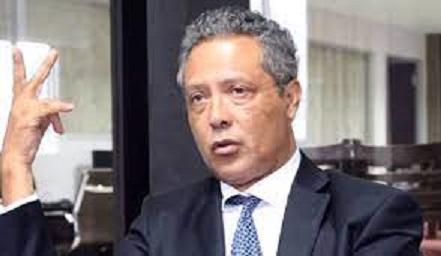Africa-Press – Mauritius. Since the Watergate affair in the United States, governmental ethics has spread its wings within American society. Several states have introduced ethics commissions to monitor elected officials and public administrators.
Unfortunately, in several other countries, developed or not, scandals follow one another and there are no sanctions against those who flout the law or morality.
However, the feeling of shame of the citizens is indeed palpable within these societies and the governmental authorities or the State apparatus are weakened by it.
In the Republic of Mauritius, the media and citizens scrutinize the slightest actions and gestures of anyone belonging to the political class. A recent event has drawn their anger. Isn’t it time to define a government ethic?
Mauritius Times: How do you read all that has been reported these days regarding the Attorney General’s alleged involvement with bettor Mohamad Hussein Abdool Rahim in illicit activities.
Judged on its face value, all this seems very serious, but Mr. Yerrigadoo claims to have acted strictly according to the provisions of the law. I am appalled by all that I learned.
I cannot comment one way or the other, but the letter that emanates from him, which he acknowledges having issued, does not fall within the scope of his constitutional powers as Attorney General. I quote the text of the Constitution from memory: “The Attorney General shall be the principal legal adviser to the Government”. Mr.
Yerigadoo cannot – even by the most extensive reading of the Constitution – claim to have suddenly become the legal adviser to all comers, especially to certain unsavory people, one of whom has admitted to pleading guilty.
of a charge of fraud before the Intermediate Court. This is why I share my dismay with you. I do not know who is telling the truth and who is saying false, but it would seem that there are other dimensions to this affair which could be revealed to us, later, after investigation by the sleuths of the ICAC.
Reading between the lines, it seems to me that this whole affair could have other dimensions and other international ramifications. This might just be the tip of the iceberg.
But let’s not prejudge anything. . . * What do you read between the lines? If I’m not mistaken, the case has an international dimension. I cannot understand why it would have been said, at a certain point, to make a transaction only in cash.
I do not understand this. Why only want a cash transaction? Why not make a bank transfer? One may wonder if everything does not fall under FIAMLA’s control. The question remains.
Moreover, from an institutional point of view, the explanation provided about the letter from the Attorney General concerning the extraterritorial activities of a habitual criminal poses a problem.
Not long ago, the country witnessed, under the former government, the troubles that we know of the former Keeper of the Seals following a banal car accident followed by a “road rage”, by cons, not trivial.
A new Attorney General, Ravi Yerrigadoo, having succeeded the old one, we had the right to expect that all of this was behind us and we thought that the page had been definitively turned.
But now the institution is splashed again. We cannot afford that when it comes to the Minister of Justice of the Republic. The authorities must act and quickly, especially since this is not the first time that he has made the headlines.
* Are there any provisions in the law that would allow the Attorney General to give this kind of ‘safe conduct’ to a bettor?
No, this is not provided for by law. This has never happened in the past. I have known many Ministers of Justice during my career and I have rubbed shoulders with several of them.
This is the first time I’ve heard that this is allowed. One would have to ask those who have been at the Parquet for several years. But I don’t see anyone saying the opposite of what I’m telling you.
Mr. Yerrigadoo is not the legal adviser at all as far as I know. He is not empowered to issue safe-conducts or issue certificates of compliance. This is not within the jurisdiction of an Attorney General under Section 69 of the Constitution.
If someone needs a character certificate, they must go to the police and the request is then dealt with at the office of the Director of Public Prosecutions by the Law Officers. If there is a need for verification, this takes place at Line Barracks at the Criminal Records Office (‘CRO’).
It is these “records” which are authentic and which allow the police to issue a ‘Certificate of Previous Convictions’, given to the Court if ever an accused – having been convicted – has a background.
On the other hand, character certificates are issued by the lawyers of the DPP office who are the only ones authorized to do so. It is not for the Attorney General to issue a letter or such a certificate to a gambler telling him which law applies or does not apply. It is not within his remit. I must say that I was shocked by Mr. Yerrigadoo’s explanations on the radio. I must admit that I fell from above. . .
* The former Attorney General, Me Rama Valayden, maintains that the action of Me Yerrigadoo – that is to say the drafting of a letter to authorize a payment to a bettor – is “extremely rare” on the part of of an Attorney General, but adds, however, that the latter should have exercised “caution”.
Is he wrong? I don’t understand how the expression “extremely rare” can be applied to this sordid affair. If we follow this reasoning, it means that it is therefore possible to do so, but only in cases that are ‘extremely rare’.
Which ? I don’t think that’s possible at all! Perhaps we should ask those who have been Ministers of Justice in the past what they think of it. I do not see how it can come within the powers of an Attorney General to issue safe-conducts.
If a person needs safe conduct, they must contact the competent authorities. In the case that concerns us, the problem, from what I understand, is that the person to whom the certificate was given is someone who was convicted following an admission of guilt.
The person pleaded guilty. Now we are told that what Mr. Yerrigadoo claims is gospel. Personally, I do not share this opinion at all – because since 2002 we have had a text on Anti-Money Laundering which applies to financial transactions.
How in such a case can we give a ‘safe conduct’ to an ‘international gambler’, doubled as a crook? If you are a self-respecting international ‘zougadère’, contact the FSC, your banker, the Bank of Mauritius or even the GRA!
* Betting abroad is not an offense in itself, right? Not that I know ! However, that is not the question. What is at issue is not betting abroad.
The root of the problem is to knock on the door of the Minister of Justice in order to obtain a “safe conduct” to pull the chestnuts out of the fire and to be paid for his earnings abroad. I think that you can legally bet abroad provided that it is not prohibited by the legislation of the country where you place your bet.
What could prevent a Mauritian national from playing Black Jack at the Monte Carlo casino or losing his money by betting on a loser who runs in Macau? As far as I’m concerned, if I want to play Lototech, I go around the corner, I take a coupon at Quick Pick.
Why do you have to bother trying to circumvent the laws of a foreign country or trying to find out which regulations apply or do not apply! What I know is that we have in Mauritius a text which governs gambling locally but this text does not say whether a person has the right to play or not to play abroad.
If the person is abroad and wants to play the Loto, nothing prevents him from doing so. On international networks, what they sometimes do to circumvent local legislation: the bet is subscribed by a person from the country because only people who are physically there have the right to bet.
Recently, there was a case in America where a stranger scooped the Lotto jackpot by betting online. This had caused quite a controversy in the United States.
This person had played online and had actually won the jackpot worth several million US dollars. It is therefore necessary to check which country’s regulations apply in which circumstances.
If the bettor has won and the entity that organizes the bet abroad does not want to pay the winnings to the bettor, it is subject to the law and the courts of the country where the person bet their money and won.
I do not see how this can concern the Minister of Justice of our country. * Mr. Valayden is nevertheless right on one point: the lack of caution on the part of the Attorney General, since the whistleblower would be in possession, according to Mr.
Roshi Bhadain, of messages, documents and compromising photos for Mr. Yerrigadoo. This also raises questions about the motivation of the whistleblower, doesn’t it? While it is true that Mr.
Bhadain has incriminating messages, documents and photos, not to mention certain transactions that allegedly took place abroad, this is no longer a matter of caution.
We would be there in another register. Mr. Yerrigadoo is involved in a much more serious matter than what Mr. Bhadain says, since he has announced that he intends to refer the matter to the ICAC for an investigation.
I don’t understand how an Attorney General can have such disreputable people around him. From what I understand, the person who made revelations against Yerrigadoo would have sworn an affidavit where he mentioned the names of other people as well as the sums in euros that he would have won.
I do not see how it can be the responsibility of the Attorney General to provide expert advice on how to get the chestnuts out of the fire! Frankly, I don’t understand how he could have gotten into this.
* The fact that the whistleblower allegedly kept documents and photos in his possession, does this not raise questions as to his motives? Most likely. Motivation or not, what interests us is to know the degree of involvement of the Attorney General in this case.
If he has exceeded the parameters of his constitutional attributions and functions and if he has recklessly compromised himself in a dubious matter, he must bear the consequences.
We cannot allow the institutions to be splashed. Institutions are important, not individuals. If the institution has been splashed, in one way or another, that is enough to act.
I don’t need to know whether to wish the sinner dead or not. It’s not my role to judge people. I reserve judgment. Also, I don’t know what’s going on underneath.
But it seems to me that it is something bigger. There will likely be more revelations to come. Where there are money stories, it’s best to stay away from that when you’re Attorney General.
I don’t see what an Attorney General has to do with any of this. This is something that falls under the GRA. If anyone has problems with betting abroad, they go to the GRA.
If we have problems with investments abroad, we go to see an accountant, a banker, or the Bank of Mauritius, but that does not come out of the Attorney General.
It has nothing to do with our law. I don’t understand why he put himself in this situation. Why give advice? And why get involved in investments in Dubai? How do these kinds of transactions relate to the position of Attorney General?
* Some took care not to react immediately: the current president of the Bar Council will seek information before reacting and bringing the matter before the members of the Council.
The leader of the MSM also displays caution, he follows the developments, he says. How do you react to this? Everyone operates in their own way. I can’t blame either of them for being overly cautious.
They must be sufficiently informed before taking the necessary decisions, but already, in view of the explanations which were provided on the radio and in view of the letter which was issued by the Attorney General and which he acknowledges having issued, certain conclusions are in order.
I tell you again that the Attorney General has exceeded his constitutional powers and that already there, he should be sanctioned. It’s my point of view.
We can legitimately have a different point of view. The Bar Council and the Prime Minister will think and do what they want. My principle is that we cannot allow institutions to be compromised and splashed.
This is not the first time that we have experienced this kind of event. It’s the second time. After the episode of the former Attorney General, Yatin Varma, there was no need for another scandal which damages the image of the institution.
I must recall, moreover, that this is not the first time either that Mr. Yerrigadoo has found himself at the center of a controversy. This is not the first time he has made headlines in less than rosy circumstances.
Remember his involvement in the Dufry affair. He had met at his home the two representatives of Dufry in the company of Roshi Badhain and Pravind Jugnauth, then Deputy Prime Minister and Minister of Finance.
I am well placed to know what happened in the Dufry affair because I met the two protagonists who had sworn an affidavit and I know what we had discussed.
In addition to the three friends, there was also a certain Rakesh Gooljaury who wanted the former CEO of Duty Free Paradise to agree to reschedule his debts… Nothing less than that.
And the CEO had played me the recording he had made of the words of a police officer. The latter had gone to meet him for this by falsely claiming that he was sent by the former Prime Minister.
And there was no sequel. . . There was no follow-up because the two foreigners (a Serb and a Frenchman) were finally able to leave the country. Before they had been told not to leave but finally they were able to do so one evening when Gooljaury was around at the airport.
We will come back to all this in due time. An affidavit that does the country no credit. I can tell you that this affair was discussed in very high places in Paris and that it did us no good at the diplomatic level.
* Which institution is responsible for investigating the Yerrigadoo case: the ICAC, the police, the FIU? There is more and more talk of the instrumentalization of state institutions for political ends – at least that is the perception…
Investigations should be conducted by law enforcement authorities. First there is the Commissioner of Police who acts under the Constitution and the Police Act.
Its independence is guaranteed by the Constitution. There are police officers who work under him but some have fun wanting to arrest Senior Advisers while the Minister is in India.
Some CCID police officers were in the pay of a former minister. They were, at that time, housed in the depths of the Line Barracks in a gray building, far from their other colleagues, away from prying eyes.
.
. There is also the ICAC which, according to a judgment of the Supreme Court, is a “new investigatory mechanism”.
The government had chosen in its time to vote, under the leadership of the current DPM, an exceptional text against itself. Now he is suffering the consequences. Now the matter is in the hands of the ICAC.
May the ICAC use its “new investigatory mechanism” wisely to take stock of this case! It turns out that in the remit of the ICAC, there are two major projects: first, corruption under the POCA, and second, financial offenses under the FIAMLA.
Let those who have the responsibility to investigate do so. That they use the emergency law to investigate and report their findings to the DPP. There is also the FIU.
Everyone must play their part. If there is nothing to complain about, all the better. But if, after an impartial investigation, it is necessary to intervene, let it be done, and the sooner the better.
* You said in a previous interview that “the worst is yet to come”.
Have we hit rock bottom? Of course, and for a very long time. How can we doubt it? We see it every day. It is the stampede. All principles are publicly flouted with impunity.
Power goes to your head, however little we have it. . . We can now do everything and with complete impunity. If you are Deputy Prime Minister, you can even publicly threaten with death – without our brave police commissioner being moved… beyond measure. César justified, in his time, the repudiation of his wife by a quip that has remained famous: ‘The wife of Caesar must be above suspicion.’
For More News And Analysis About Mauritius Follow Africa-Press







